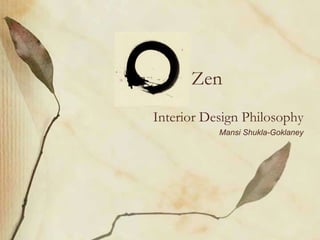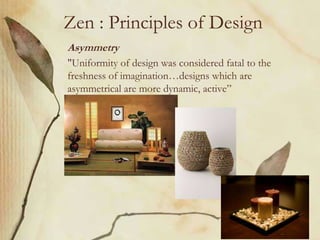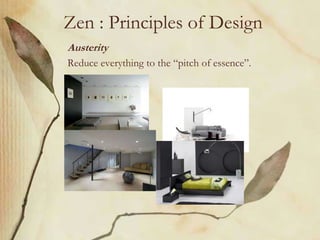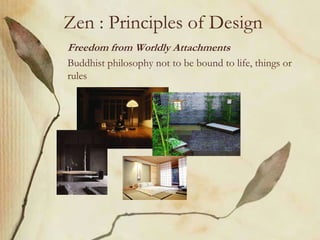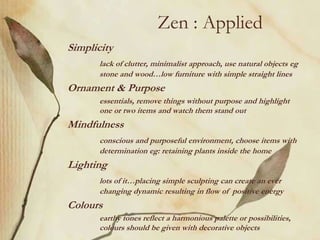Zen philosophy of interior design
- 1. Zen Interior Design Philosophy Mansi Shukla-Goklaney
- 2. Zen : Meaning & Origin Zen /zen/: A 12th century Japanese school of Mahayana Buddhism emphasizing the value of meditation and intuition rather than ritual worship or study of scriptures. Sanskrit origin: Dhyana (meditation) ŌĆ£Living fully and authentically in the present moment makes each instant of oneŌĆÖs life a peak experience.ŌĆØ
- 3. Zen : Principles of Design Asymmetry "Uniformity of design was considered fatal to the freshness of imaginationŌĆ”designs which are asymmetrical are more dynamic, activeŌĆØ
- 4. Zen : Principles of Design Simplicity Zen eschews gaudy, ornate and over embellished in favour of sparse, fresh & neatŌĆ”minimalist design
- 5. Zen : Principles of Design Austerity Reduce everything to the ŌĆ£pitch of essenceŌĆØ.
- 6. Zen : Principles of Design Naturalness Zen is artless, without pretense, or self-consciousness. ItŌĆÖs bare wood, unpolished stone, and flowers in the backyard!
- 7. Zen : Principles of Design Freedom from Worldly Attachments Buddhist philosophy not to be bound to life, things or rules
- 8. Zen : Principles of Design Subtle Profundity within Zen lies a deep reserve, a mysterious, shadowy darknessŌĆ”the hint of soft moonlight through a skylight.
- 9. Zen : Applied Simplicity lack of clutter, minimalist approach, use natural objects eg stone and woodŌĆ”low furniture with simple straight lines Ornament & Purpose essentials, remove things without purpose and highlight one or two items and watch them stand out Mindfulness conscious and purposeful environment, choose items with determination eg: retaining plants inside the home Lighting lots of itŌĆ”placing simple sculpting can create an ever changing dynamic resulting in flow of positive energy Colours earthy tones reflect a harmonious palette or possibilities, colours should be given with decorative objects
